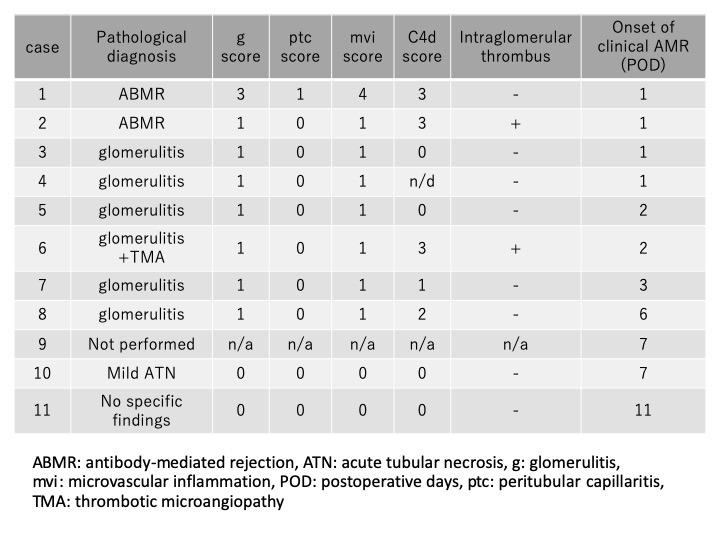Glomerulitis in One-Hour Biopsy after ABO-Blood Type Incompatible Kidney Transplantation Sensitively Suggests Occurrence of Antibody-Mediated Rejection
Renal and Genitourinary Surgery, Hokkaido University, Graduate School of Medicine, Sapporo, Japan
Meeting: 2020 American Transplant Congress
Abstract number: A-013
Keywords: Biopsy, Kidney transplantation, Rejection
Session Information
Session Name: Poster Session A: Kidney Acute Antibody Mediated Rejection
Session Type: Poster Session
Date: Saturday, May 30, 2020
Session Time: 3:15pm-4:00pm
 Presentation Time: 3:30pm-4:00pm
Presentation Time: 3:30pm-4:00pm
Location: Virtual
*Purpose: Antibody-mediated rejection (ABMR) after ABO-blood type-incompatible kidney transplantation (ABOi-KTx) can affect transplant outcome even lead to allograft loss unless promptly diagnosed and adequately treated. However, it is sometimes difficult to perform needle biopsy early post-operative phase after ABOi-KTx. Here, we aimed to investigate the relationship between ABMR and pathological findings in 1-hour biopsy.
*Methods: We identified 65 ABOi-KTx recipients undergone between 1996 and 2018 (desensitization protocol with splenectomy in 10 cases and that with rituximab in 55 cases). We retrospectively analyzed patients’ backgrounds, incidence of ABMR, and evaluated the association of 1-hour allograft biopsy obtained 1 hour after reflow of kidney allograft during operation and anti-blood type antibody titers with incidence of ABMR.
*Results: In our cohort, we observed 11 ABMR (20.0%) comprised of 3 cases with splenectomy protocol and 8 cases with rituximab protocol. The median onset of ABMR was 3 days after transplant (minimum 1 day to 11 days maximum). In comparison of the median anti-blood type antibody titers between ABMR group and non-ABMR group, (median, IgG/IgM) there were no significant difference between the groups in initial values (ABMR 64x/16x, non-ABMR 16x/16x), the day of KTx (ABMR 4x/2x, non-ABMR 4x/2x). Importantly, 1-hour biopsy frequently demonstrated glomerulitis (8 cases in 10 ABMR cases), a component of ABMR defined by Banff 2017 classification, although only 2 cases satisfied diagnostic criteria of ABMR at 1-hour biopsy. In contrast, no cases in the non-ABMR group showed glomerulitis in 1-hour biopsy. The sensitivity of glomerulitis for detecting ABMR was 70.0% and specificity was 100.0%. Interestingly, C4d staining had less sensitive for diagnosis of ABMR (sensitivity, 55.5% and specificity 37.5%, respectively). These results imply that pre-transplant anti-blood type antibody titers can’t predict incidence of ABMR but 1-hour biopsy findings can indicate early phase of ABMR after ABOi-KTx.
*Conclusions: Glomerulitis in 1-hour biopsy after ABOi-KTx sensitively suggests occurrence of ABMR. The findings of 1-hour biopsy help to diagnose and treat ABMR promptly to avoid allograft loss in the early phase after ABOi-KTx.
To cite this abstract in AMA style:
Iwami D, Hotta K, Iwahara N, Shinohara N. Glomerulitis in One-Hour Biopsy after ABO-Blood Type Incompatible Kidney Transplantation Sensitively Suggests Occurrence of Antibody-Mediated Rejection [abstract]. Am J Transplant. 2020; 20 (suppl 3). https://atcmeetingabstracts.com/abstract/glomerulitis-in-one-hour-biopsy-after-abo-blood-type-incompatible-kidney-transplantation-sensitively-suggests-occurrence-of-antibody-mediated-rejection/. Accessed February 22, 2026.« Back to 2020 American Transplant Congress

